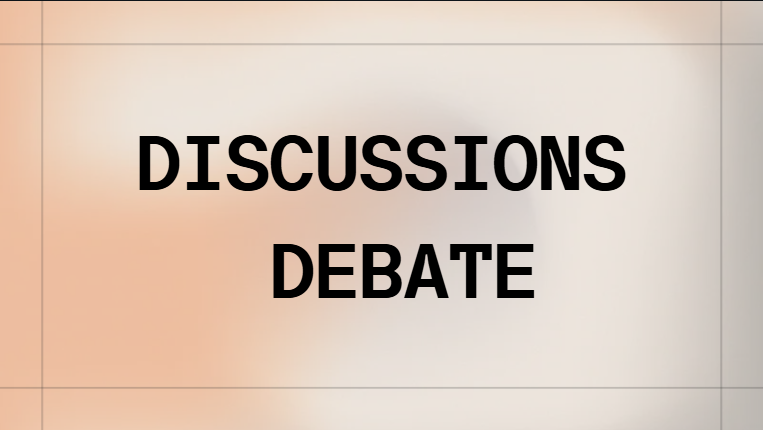In today’s world, communication plays a big role in learning, understanding, and solving problems. Two of the most powerful forms of communication are discussions and debates. Both help people share ideas, learn new viewpoints, and improve critical thinking. This article explains the meaning, importance, and skills needed for discussions and debates in simple, easy English.
What Is a Discussion?
A discussion is a friendly talk between two or more people where they share ideas and opinions about a topic. The main goal of a discussion is to exchange knowledge, not to win or prove someone wrong.
For example, students may discuss the benefits of online education or the impact of social media. Everyone gets a chance to speak and listen.
Key Features of a Discussion
- It is open-minded and respectful.
- Everyone has a chance to speak.
- The aim is to understand, not to argue.
- It helps people learn new ideas.
What Is a Debate?
A debate is a formal way of talking about a topic where two sides present opposite opinions. One side supports the topic (for), and the other side argues against it (against). The goal is to convince the audience or judges using logic, facts, and reasoning.
For example, in a school debate on “Social media does more harm than good,” one team supports the idea while the other opposes it.
Key Features of a Debate
- It is structured and follows clear rules.
- It involves arguments and counterarguments.
- The aim is to persuade or win.
- It improves public speaking and reasoning skills.
Main Differences Between Discussion and Debate
AspectDiscussionDebateGoalTo share and learn ideasTo win or prove a pointToneFriendly and openFormal and competitiveParticipantsSpeak freely and equallySpeak in turns with strict rulesFocusUnderstanding and cooperationArgument and persuasionOutcomeBetter understandingOne side wins or convinces others
In short, discussions focus on sharing, while debates focus on defending.
Why Are Discussions and Debates Important?
Both discussions and debates help in personal growth, education, and career success. Here’s why they matter:
1. Improve Communication Skills
They help you express your thoughts clearly and confidently in front of others.
2. Develop Critical Thinking
You learn to analyze information, look at different sides of a topic, and form logical opinions.
3. Boost Confidence
Speaking in front of others builds self-belief and reduces fear of public speaking.
4. Encourage Teamwork
Both activities teach respect, patience, and the value of listening to others.
5. Increase Knowledge
Through discussion or debate, you gain information from different viewpoints and facts.
Tips for a Successful Discussion
To make your discussion effective and respectful, follow these simple tips:
- Listen carefully to what others are saying.
- Wait for your turn to speak—don’t interrupt.
- Stay on topic and keep your points clear.
- Respect different opinions even if you disagree.
- Ask questions to understand others better.
- Summarize main points at the end.
Tips for a Strong Debate
If you are preparing for a debate, use these smart strategies:
- Research deeply — know your topic well.
- Plan your arguments with facts, logic, and examples.
- Anticipate counterarguments — prepare answers to possible attacks.
- Use strong body language — stand tall, make eye contact, and speak clearly.
- Stay calm and polite — never get emotional or rude.
- End with a strong conclusion to leave a lasting impact.
Common Mistakes to Avoid
Whether in a discussion or a debate, avoid these common errors:
- Speaking too much without listening.
- Getting personal or emotional.
- Using false facts or weak arguments.
- Ignoring other people’s views.
- Interrupting or shouting.
Avoiding these mistakes will make you a more effective communicator and respected speaker.
How Discussions and Debates Help Students
For students, these activities are extremely useful:
- They improve academic performance by building reasoning skills.
- They prepare students for future interviews and leadership roles.
- They create awareness about social and global issues.
- They help in building confidence and teamwork.
Teachers often encourage discussions and debates in classrooms to make learning more interactive and enjoyable.
Conclusion
Discussions and debates are not just about talking—they are about learning, understanding, and growing. While discussions focus on sharing and understanding, debates build confidence and persuasion skills. Both are powerful tools to express ideas and develop communication abilities.
Whether in school, workplace, or everyday life, being good at discussing and debating helps you think better, speak better, and connect better with others.
FAQs
1. What is the main difference between discussion and debate?
A discussion is a friendly exchange of ideas, while a debate is a formal argument where two sides present opposite opinions.
2. Why are debates important for students?
Debates help students improve public speaking, critical thinking, and confidence.
3. How can I become better at discussions?
Practice active listening, stay calm, and respect others’ opinions. The more you participate, the better you become.
4. Can discussions turn into debates?
Yes, sometimes discussions can become debates if participants start defending their views strongly. The key is to stay respectful.
5. Which is more useful—discussion or debate?
Both are useful in different ways. Discussions help in learning and understanding, while debates help in developing logic and persuasion skills.


